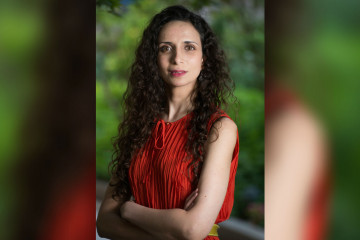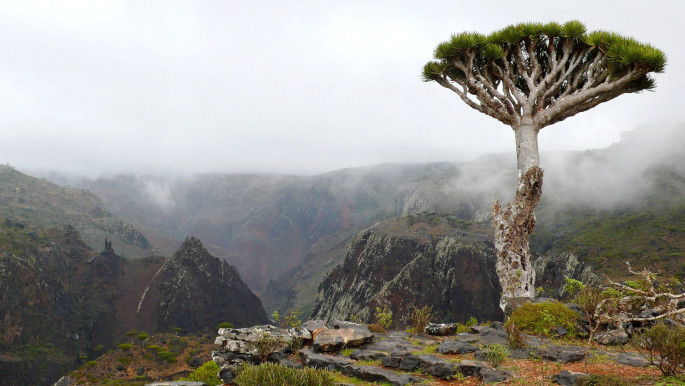
Yemen's Ella al-Shamahi: Unearthing the past, preserving the future

As an Arab woman, securing a leading role on an international broadcaster was itself an achievement for Ella, who said "it's just great to have an Arab woman on screen, there's not many of us". But that's just one struggle.
"I mean people are often quite celebratory of me – westerners are often quite supportive and think I'm ballsy but there's obviously a lot of sexism and misogyny you have to deal with, but you know, what are you going to do? Not do it?"
Many obstacles, brainstorming sessions and meetings later, she found herself on a boat with a superbly talented team of "three white men," she jokes, heading toward what has become the home of the "world's worst humanitarian crisis" – but also the home of her own ancestors, to collect information for a potential large-scale expedition in Yemen.
"We studied pirate incident reports and tried to get as much intel as we could before heading off. We knew that, unlike mainland Yemen, Socotra was safe – it's just getting there that's the issue. I constantly work with teams who are willing to take a risk and that's what we did."
"Heritage sites are either a celebration of what our ancestors have created or a celebration of what our planet naturally creates"
Exactly three years to the week she made the valiant voyage, Yemen was ravaged by airstrikes after neighbouring Saudi Arabia formed a military coalition to push back Yemen's Houthis rebels who overran large parts of the country, including the capital Sanaa just months earlier.
Airstrikes began pounding the rebel's northern city of Saada as well as the capital, waging a deadly war in a country that is home to more than 22 million, and thousands of years of history, culture and heritage.
Unbeknown to most, the Middle East's poorest nation in fact hosts a wealth of precious gems, four of which, including the Old City of Sanaa, the historic town of Zabid and Shibam's walled skyscraper city, have been honoured as UNESCO world heritage sites.
But far from the cultural heritage sites in mainland Yemen, Ella was on a wooden cement-cargo ship hundreds of miles off the coast of the country to explore its one and only natural UNESCO heritage site – the Yemeni island of Socotra.
 |
|
| The crew travelled to the Yemeni island by boat [Instagram] |
"Socotra is a UNESCO site that isn't quite like the others. Heritage sites are either a celebration of what our ancestors have created or a celebration of what our planet naturally creates," she said.
With white beaches, turquoise water, unique botany and animals, Socotra is indeed a remarkable feat of nature's work.
"You just sit there and you're like... there are few places on this planet that are like this," she said. "It's so, so astoundingly beautiful but it's also so delicate as well."
The archipelago which sits at the exit of a bustling shipping lane that leads from the Mediterranean Sea to the Indian Ocean is truly unique in all senses of the word. Home to some of the world's rarest plants, and animals, the island's landscape is decorated with its own native Dragon's Blood trees, a grand umbrella-like tree that produces or "bleeds" red sap.
"What people don't realise is that a lot of the species on the island exist there and nowhere else because they are refuge populations. That means they used to exist in a much wider geographical area but they gradually became extinct everywhere else but, on this island," she emphasised.
"With white beaches, turquoise water, unique botany and animals, Socotra is indeed a remarkable feat of nature's work"
"That's how precious Socotra is, it's holding on to this rare population of trees and animals and it's so easy for them to become extinct completely. That's why it's so important that we look after that place. When they're gone, they're gone forever," the expert warned.
 |
|
| Socotra is a UNESCO world heritage site [Getty] |
Despite growing up in the United Kingdom, Ella has remained connected with Yemen and has even made several attempts to visit the country since the war escalated with the Saudi-led coalition intervention in March 2015.
Dozens of Yemen's cultural heritage sites have been damaged, or in some cases completely destroyed, by a conflict that has also left more than 10,000 Yemenis dead.
The capital's 2,500-year-old city has suffered devastating damage, the Great Marib Dam which was built by the Saba dynasty centuries before the birth of Christ was destroyed and the 12th-century al-Qahira citadel in Taiz was also struck before being recently renovated by UNESCO.
But these are just some of at least 80 historical sites affected by the war.
"When your ancestral homeland is at war, it can be really depressing," Ella sombrely said. "The thing with UNESCO sites in Yemen is they are under serious threat. A lot has been damaged."
While UNESCO has clearly and strictly outlined the procedures to operate heritage sites, the task has proven to be quite difficult for locals in Yemen.
"It's not so much about convincing anyone of the importance of our sites, but it's about giving them the tools and solutions to preserve it"
"There is corruption and abject poverty in the country," Ella explained. "Corruption and lack of oversight mean people are free to build on heritage sites, but even then, poverty means these same people cannot afford the right materials to build.
"In Yemen, we don't need someone from outside to tell us how amazing and precious our country is. Yemenis are so proud, and rightly so, of their heritage. So, when you see the devastation to our sites you see Yemenis immediately kick up a fuss about it. Politicians especially are the biggest advocates of preservation," Ella added.
"It's not so much about convincing anyone of the importance of our sites, but it's about giving them the tools and solutions to preserve it."
Although the island has been largely exempt from the conflict, Socotra has in recent weeks been the cause of rising tension between the Saudi-led coalition, notably the United Arab Emirates, and the internationally-recognised government of Yemen.
A recent deployment of Emirati forces on the island triggered an uproar across the country, forcing locals to mobilise protests on the island to denounce what was described as an Emirati "occupation" of Yemeni territory, a move that fell short of dividing the coalition with its Yemeni allies.
While Yemeni officials insist the dispute has now been resolved, residents of the island remain weary of the UAE's growing influence in Socotra and the south of mainland Yemen.
More than 10,000 people have been killed since the Saudi-led coalition intervened to support the government in its fight against the rebels. Actors involved in the deadly war have been heavily criticised by the UN and international rights organisations but calls to preserve the people and Yemen's rich heritage have so far failed to flourish on the ground.
"It's really important that all players and most importantly, people of the island, continue to talk about what is going on in Yemen, both in terms of politics and environment, and that solutions are found that protect both the people and its delicate natural gems."
When all is said and done, it's clear that while Ella is on a mission to unearth the history of mankind, her fight to preserve its future is just as, if not more, important.
The second episode of Neanderthals: Meet Your Ancestors will air on BBC2 on Sunday 20 at 8 pm.
Sana Uqba is a journalist at The New Arab.
Follow her on Twitter: @Sanasiino


